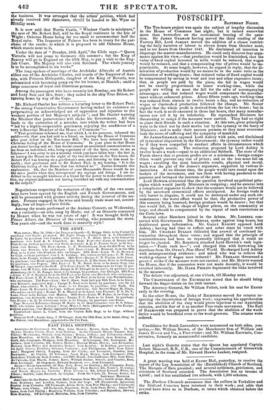POSTSCRIPT.
SATURDAY NIGHT.
The Ten-hours project was again the subject of lengthy discussion in the House of Commons last night ; but it turned somewhat more than heretofore on the economical bearing of the ques- tion. Sir JAMES GRAHAM having moved the third reading of the Factory Bill, Lord ASHLEY moved the addition of a clause restrict- ing the daily duration of labour to eleven hours from October next, and to ten hours from October 1847. He disclaimed all intention to disparage the master-manufacturers. He could only discover four argu- ments against his view,-that production would be diminished, that the value of fixed capital invested in mills would be reduced, that wages would be reduced, and that a compensating rise of prices would be im- practicable. At some length, however, he argued in reply, that the di- minution of production would by no means be in the same ratio as the diminution of working-hours ; that reduced value of fixed capital would be compensated by saving in wear and tear and other expensive items ; that, as people are paid by the piece, the fall in wages would not be exactly proportioned to lesser working-time, while the people are willing to meet the fall for the sake of accompanying advantages ; and that reduced wages would compensate the manufac- turer without enhanced prices. About fifteen years ago, working-time was reduced from sixteen to twelve hours a day, and no reduction of wages or diminished production followed the change. Mr. Senior argued that the whole profit is derived from the last two hours ; but in fact the work is so ill-executed in those last hours, that many manufac- turers can tell it by its inferiority. He reproached Ministers for threatening to resign if the measure were carried. They had no right to place their friends in such a situation. At this rate, great principles were to be tried not by their merits but by the tyranny or the fancy of Ministers ; and to make their success permani nt they must overcome both the sense of suffering and the sympathy of mankind.
Sir JAMES GRAHAM opposed Lord Ashley with pain, and disclaimed all tyrannical disposition in the Government: the tyranny rather would be if they were compelled to conduct affairs in circumstances which they thought unsafe. The reduction proposed by Lord Ashley is twelve hours a week-equal to an additional Sabbath. The state of the Funds shows that at present profits are at a minimum : foreign compe- tition would prevent any rise of prices ; and so the loss must fall on wages ; entailing the most lamentable results, physical and moral. Such was the gist of Sir James's argument, supported by various il- lustrations. At no distant time, the people would turn round upon the leaders of the movement, and tax them -with having pandered to the passions and betrayed the interests of the poor. Lord HOWICK contended that the question involved no political prin- ciples which would justify Ministers in resigning ; and he entered into a complicated argument to show that the measure would not be followed by the untoward economical effects anticipated. As foreign trade is only barter in disguise, it could not be destroyed under any such cir- cumstances: the worst effect would be that, the productive power of this country being lessened, foreign produce would be dearer ; but that loss would fall, in the shape of higher prices on the community at large, and should be compensated by the repeal of such restrictions as the Corn-laws.
Several other Members joined in the debate. Mr. LIDDELL con- curred with Government. Mr. BERNAL spoke against long hours, but desiderated more information. Mr. GAILY KNIGHT opposed Lord Ashley ; having had time to reflect and sober since he voted with him. Mr. CHARLES BULLER ridiculed that avowal of continued in- toxication throughout three votes ; and argued that the principle of noninterference had been so repeatedly infringed that it could no longer be pleaded. Mr. ROEBUCK attacked Lord Howick's rash legis- lation -" Fools rush in-"; and charged him with borrowing his doctrines from Mr. Owen's New Moral World. He charged Lord Ashley with misrepresenting evidence ; and asked who was to relieve the working-classes if wages were reduced ? Mr. FERRAND threatened a general strike if the measure were not carried ; and Mr. Muir= warned the House, that if the concession were not made decently, it would be extorted indecently. Mr. MARK Psnices deprecated the risks involved in the measure.
The debate was adjourned, at one o'clock, till Monday next.
The CHANCELLOR of the EXCHEQUER stated that he should bring forward the Sugar-duties on the 24th instant.
The Attorney-General, Sir William Follett, took his seat for Exeter early in the evening.
In the other House, the Duke of RICHMOND moved for returns re- specting the importation of foreign wool ; expressing his apprehension that the abolition of the duty would prove injurious to our Australian colonies, and his fear of it as another Free-trade movement. The Earl of Daimons= was prepared to prove that the abolition of the wool. duties would be beneficial even to the wool-growers. The returns were ordered.


























 Previous page
Previous page